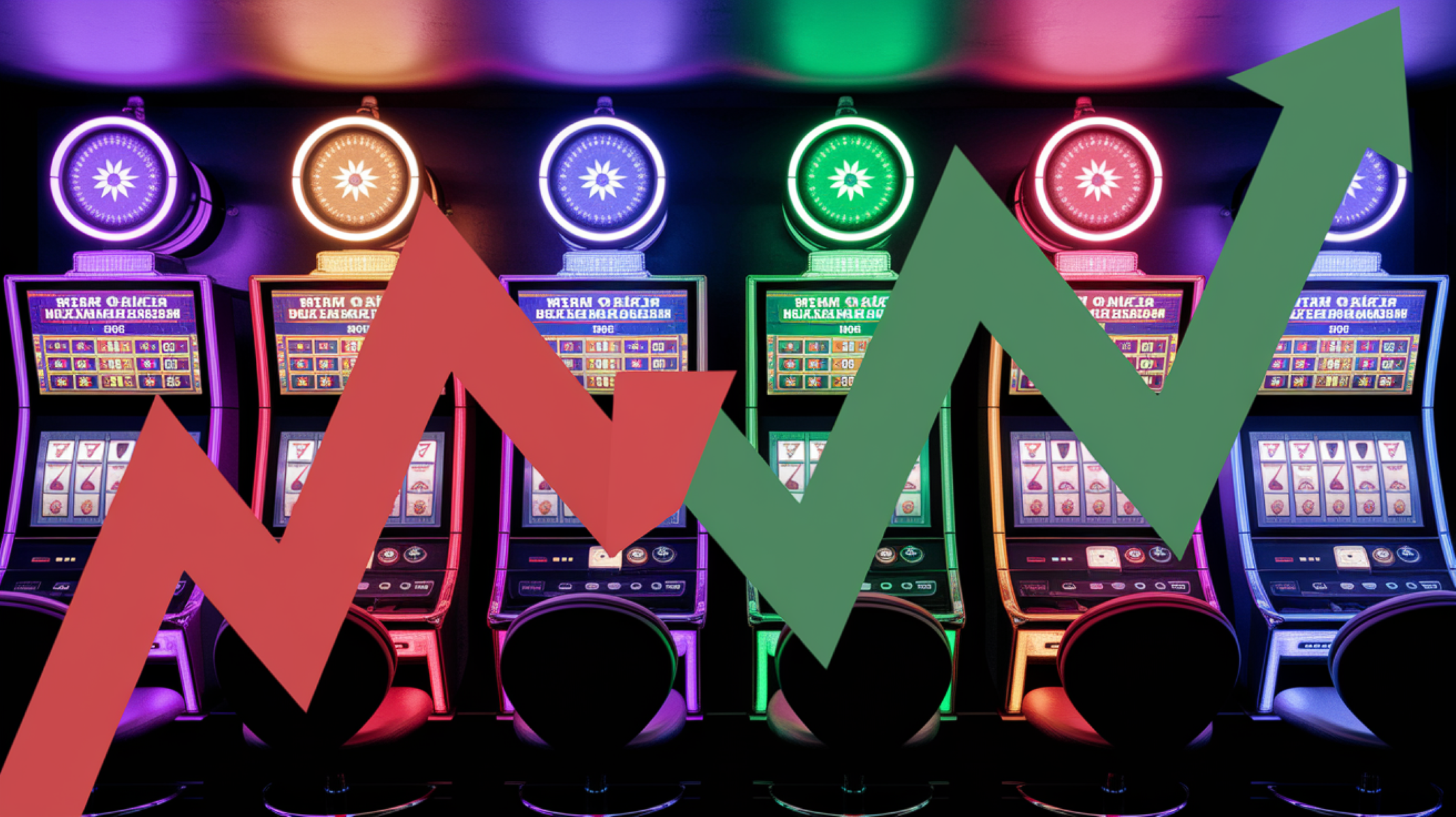Have you ever spun a slot and wondered why sometimes you win a little, but other times… boom, a massive jackpot? That’s volatility at work! Let’s dive into how South African casinos actually figure this out.
What is Slot Machine Volatility
Slot machine volatility, also known as variance, describes how often and how much a slot machine tends to pay out. It’s a key concept that defines the risk level of the game. Slots with low volatility typically offer frequent but smaller payouts, which means players enjoy a steady stream of wins without huge swings in their bankrolls. On the flip side, high volatility slots might not pay out as often, but when they do, the wins can be substantial and sometimes life-changing. This risk-versus-reward balance is central to the gaming experience and directly influences player satisfaction. It’s like comparing a slow-and-steady tortoise, consistently moving forward, to a wild, unpredictable hare that makes sudden, dramatic leaps.
In simple terms, understanding volatility helps players manage their expectations.
- Low volatility slots = frequent small wins, longer playtime.
- High volatility slots = rare but large wins, more risk involved.
If you’re someone who enjoys long gaming sessions with regular excitement, low volatility games are your best friend. If you’re hunting for that one massive payout and can tolerate long dry spells, then high volatility slots are where the real adventure begins. Knowing which type of game suits your personality and budget can make all the difference between an enjoyable experience and a frustrating one.
Why Volatility Matters to Players
Volatility isn’t just casino lingo — it’s a tool that players can use to choose games that match their goals and bankrolls. Imagine walking into a casino with a limited budget. Would you rather have two thrilling spins with a high chance of losing it all, or stretch your entertainment for hours with smaller but more frequent wins? That’s exactly why understanding volatility is critical. Players who grasp the concept can pick machines that align with how much risk they’re willing to take and how long they want to stay in the game. It ultimately impacts your gaming strategy, whether you’re playing casually or aiming for a big win.
Knowing the volatility level of a slot empowers players to play smarter.
- Low volatility = ideal for longer, relaxed gaming sessions.
- Medium volatility = perfect for a balanced experience between risk and reward.
- High volatility = designed for risk-takers chasing huge jackpots.
Volatility also influences bankroll management. A player with a limited bankroll might stick to low volatility slots to maximize playtime, while a high roller looking for massive returns might dive headfirst into high volatility games. Being aware of volatility helps players make informed decisions rather than relying purely on luck or impulse.
Slot Machine Mechanics
Understanding how a slot machine works is crucial if you really want to grasp the meaning of volatility. Behind every flashing light and spinning reel is a highly sophisticated piece of technology programmed to deliver a randomized experience. Slot machines use algorithms and digital software to simulate the feeling of a mechanical machine while actually operating on complex, invisible calculations. Modern slots often feature multiple paylines, bonus rounds, and special symbols, each affecting the overall volatility of the game. This unseen machinery ensures that no two spins are ever truly alike, keeping players guessing and the excitement alive.
The mechanics involve several core elements:
- Reels and Symbols: The basic structure of the game.
- Paylines: How symbols align to create winning combinations.
- Random Number Generators (RNGs): The brain behind the randomness.
- Payout Tables: Lists of winning combinations and their values.
All these factors work together to create a game that feels fair and thrilling. Understanding these mechanics can help you appreciate why certain slots behave the way they do — and why some seem “hot” or “cold” when, in reality, it’s all just part of the random design.
The Role of Random Number Generators (RNGs)
The Random Number Generator (RNG) is the beating heart of any slot machine. It’s a digital algorithm that continuously produces thousands of random number sequences every second, even when nobody is playing the game. As soon as you hit “spin,” the RNG locks in a random number that determines where the reels will stop. Thanks to RNGs, every spin is independent of the last — there’s no “hot” or “cold” streaks programmed into the machine. It’s pure chance. South African casinos, just like those in major gaming hubs around the world, must have their RNGs tested and certified by regulatory agencies to ensure complete fairness.
Here’s why RNGs are essential for fair gaming:
- Ensures random outcomes for every spin.
- Prevents manipulation by casinos or players.
- Maintains the integrity of payouts and jackpots.
For players, the existence of RNGs means that no amount of “systematic” play or “lucky timing” can influence the outcome. This knowledge helps set realistic expectations and encourages responsible gambling behavior. In South Africa, strict compliance requirements mean players can trust the fairness of the slots they play, whether at big resorts like Sun City or local licensed establishments.
Payout Structures and Probability
Every slot machine comes with a built-in payout structure that dictates how much a player can win for different symbol combinations. This “paytable” is typically available within the game’s information screen and serves as a roadmap for potential payouts. Symbols that are common — like cherries or 10s — usually offer smaller rewards, while rare symbols — like golden lions or treasure chests — offer much bigger prizes. This balance directly impacts the machine’s volatility: slots with high-value rare symbols usually have higher volatility, while those that pay out frequently for common symbols have lower volatility.
Payout structures also relate closely to the mathematical concept of probability.
- Higher frequency of small wins = low volatility.
- Lower frequency of big wins = high volatility.
Understanding a machine’s paytable can give players a sneak peek into its volatility level before they even spin. Look for clues like jackpot sizes, bonus game difficulty, and the gap between small and big payouts. The broader the gap and the rarer the big payouts, the more volatile the game is likely to be. Knowing how to read a paytable and interpret the probability behind payouts is a powerful skill that sets serious players apart from casual spinners.
Volatility Classifications in Slots
When it comes to slot machines, understanding volatility classifications can completely change your gaming experience. Volatility refers to the risk level associated with a particular slot — essentially, how often and how much you can expect to win. Different slots are designed for different types of players, and the level of volatility helps players match their risk appetite with the right game. It’s like choosing between a calm day at the beach or surfing massive waves — both can be fun, but they appeal to very different personalities.
| Volatility Level | Frequency of Wins | Size of Wins | Ideal For |
| Low | Very frequent | Small | Casual players, longer sessions |
| Medium | Moderate | Medium | Players wanting balanced gameplay |
| High | Rare | Very large | Risk-takers chasing huge payouts |
Low Volatility Slots
Low volatility slots are built for players who prefer a smooth, consistent gaming experience. These games offer frequent, small payouts, keeping the action steady and reducing the chances of losing money too quickly. It’s a style that suits casual players perfectly, as it allows for extended play without significant emotional highs and lows. Think of it like small, gentle waves softly rolling onto the beach — always in motion, always pleasant, but never too overwhelming. If you want a relaxed gaming session where you enjoy lots of small wins to keep your spirits up, low volatility slots are your best friend.
However, low volatility comes with a trade-off: you are unlikely to land a life-changing jackpot. While winning often feels great, the amounts usually won’t be enough to make a major impact on your bankroll. These games are about entertainment rather than massive profits. In South African casinos, low volatility slots are very popular among tourists and casual players who want to have fun without risking big losses. They’re perfect for players looking for longer sessions on a modest budget, offering a stress-free way to enjoy the thrill of the casino.
Medium Volatility Slots
Medium volatility slots offer a balanced gaming experience by combining elements of both low and high volatility machines. These games provide a middle ground where you can expect a decent number of wins and occasional bigger payouts, keeping the excitement level high without the extreme risks of high volatility slots. Imagine the medium-sized waves at a beach — thrilling enough to have fun, but still manageable. Players who want a bit of everything — steady wins and the chance for occasional large rewards — find medium volatility slots highly appealing.
In South African casinos, medium volatility slots are among the most popular choices because they suit a wide variety of players. Whether you’re relatively new to gambling or a seasoned pro looking for a consistent thrill, these games deliver. They create an engaging balance between risk and reward, keeping players interested without pushing them into long losing streaks. If you want a good mix of small wins and a real shot at a sizable bonus round payout, medium volatility slots are absolutely worth considering.
High Volatility Slots
High volatility slots are designed for players who love a serious challenge and the possibility of enormous rewards. These games are characterized by long periods without a win, but when they finally pay out, they often do so in spectacular fashion. Think about massive, towering ocean waves — unpredictable, dangerous, and thrilling all at once. High volatility slots are all about high risk and high reward. They’re made for players who are patient, willing to accept losing streaks, and excited by the possibility of a massive jackpot at the end of the tunnel.
In South African casinos, high volatility slots usually generate a lot of buzz because of their association with big jackpot wins. These slots are often the centerpiece of major casino floors, luring in players who dream of a single spin changing their lives. However, they require careful bankroll management and a strong mindset to handle the emotional ups and downs. If you’re the kind of player who dreams big and isn’t afraid to go for broke, high volatility slots will definitely deliver the kind of thrilling, heart-pounding experience you’re looking for.
How South African Casinos Measure Volatility
While players experience volatility during their sessions, casinos actually measure it scientifically and systematically behind the scenes. Especially in South Africa, where gambling regulations are strict, casinos must rigorously test every slot machine before it can be placed on the floor. Measuring volatility involves understanding the statistical behavior of a machine over millions of spins. This is not guesswork; it’s a detailed process involving data gathering, simulations, and regulatory oversight to ensure that games are fair, transparent, and correctly categorized for player protection.
This careful approach benefits both players and casino operators. Players can trust that the games they are playing are certified and behave as advertised, while casinos can market their slot machines accurately. By knowing the volatility profile of each machine, casinos in South Africa can cater to different player preferences, offering a wide range of experiences from steady, relaxing slots to intense, high-stakes machines that appeal to risk-takers.
Statistical Analysis and Data Collection
The first step in measuring slot machine volatility is extensive statistical analysis and data collection. Casinos and game developers simulate millions of spins to understand exactly how the game performs over time. This data collection focuses on a few critical points: how often wins occur, how large those wins are, and how wins are distributed across a large sample size. By analyzing this mountain of information, casinos can accurately categorize a game’s volatility level and ensure that its advertised payout structure matches its actual behavior.
Key data points include:
- Win frequency: How many wins occur during millions of spins.
- Win size: Average size of winnings compared to the total bet.
- Win distribution patterns: How winnings cluster (steady, random, rare).
This massive data-driven process ensures that every slot machine meets regulatory standards and provides players with a predictable gaming experience. In South Africa, this level of oversight is crucial to maintain fairness and uphold the integrity of the gaming industry.
Simulations and Testing
Once the initial data is collected, casinos move into the simulation and testing phase. This involves using advanced software to simulate thousands or even millions of spins under various conditions. These simulations replicate real-world play as closely as possible, accounting for different betting behaviors, session lengths, and other player interactions. The goal is to confirm that the machine’s performance — especially volatility — stays consistent regardless of how it’s played.
Testing focuses on several areas:
- Stress testing: Ensuring outcomes remain stable even with different betting strategies.
- Edge case analysis: Identifying rare scenarios that could impact fairness.
- Long-term trend observation: Confirming that over millions of spins, the machine behaves predictably within its volatility class.
This rigorous testing phase ensures that slot machines are safe, fair, and reliable for players. In South Africa, gaming authorities require certification reports from accredited testing labs before approving any new slot machine for public use.
Using Volatility Index Scores
To make the concept of volatility easier for players and regulators to understand, casinos often assign each slot machine a Volatility Index Score. This score typically ranges from 1 to 10, with 1 representing extremely low volatility (frequent small wins) and 10 representing extremely high volatility (rare but massive payouts). In South Africa, many regulatory bodies require volatility scores as part of the game’s certification process to ensure transparency for players.
Typical Volatility Index breakdown:
1-3: Low volatility — frequent, smaller wins.
4-7: Medium volatility — balanced wins and risks.
8-10: High volatility — rare, massive wins with high risk.
This simple, numeric system allows players to quickly understand what kind of experience they’re signing up for. It also helps casinos organize their slot floors to appeal to different types of players, from cautious newcomers to adrenaline-seeking high-rollers.



